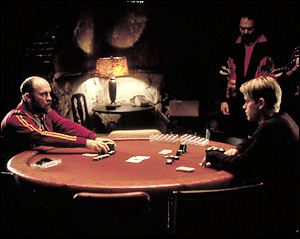 In school, math never really interested me. It’s a shame, because if there ever existed a subject that I was “a natural” in, it was math. I just found it boring and steadfastly refused to do the work or pursue it to maximize my natural potential. In fact, I didn’t do a lot of school work in high school, but that’s another topic altogether.
In school, math never really interested me. It’s a shame, because if there ever existed a subject that I was “a natural” in, it was math. I just found it boring and steadfastly refused to do the work or pursue it to maximize my natural potential. In fact, I didn’t do a lot of school work in high school, but that’s another topic altogether.
Probability, or odds, never interested me either. That is, until I started playing poker. Suddenly, I was very interested in odds, and I started seeing them everywhere–both on and off of the felt. In poker, simply knowing the odds can make a bad player decent, and a decent player very good.
Now, there are all kinds of odds in poker, but perhaps the most important is called the “pot odds.” Basically, what are the odds of making my hand compared to the amount of money in the pot? Not to get to technical, but say I need one card to complete my flush with two cards to come, I have roughly 2-1 odds of completing my hand (and hopefully winning the pot). If I have to match a $10 bet to continue, and there is only $15 in the pot, I’m not getting the correct odds to call (3-2 instead of 2-1). If, however, I have to call $10 in a $100 pot (10-1 odds), that’s a “bet” I make every time. Regardless of whether I make my hand in this particular case, I will make money in the long run if I get these odds in these circumstances enough.
However, in poker like in life, the true odds are almost impossible to know. What if most or all of the cards I need to complete my hand have already been dealt? Or, what if my opponent has a better flush draw or will make a better hand than mine?
And to further complicate the seemingly simple pot odds, there are “implied odds.” Let’s go back to the first example where I have to pay $10 into a $15 pot. Initially, this seems like a bad bet, but what if this player has a tendency to go all-in after all the cards are dealt? If the other player is sitting on a large stack of chips, I could potentially win huge by calling a slightly unfavorable first bet.
There are many correlations between poker and life, and I think that’s why I liked the game so much. The lessons learned on the table translated directly into life. And nowhere is this more apparent than the odds we face every single day.
It has now been nearly two years since I came to Korea, and I’ve been reflecting on what that meant for the trajectory of my life. My mom likes to tell me that she’s proud of the risk I took, but I didn’t see it as a risk at all, and still don’t. Korea had a very high probability of stabilizing my finances, but a very low probability of leading to a long-term career.
Staying in Milwaukee, on the other hand, was incredibly risky. The odds of me finding long-term employment were very low, but if I had, I might be better off than I am now.
Stability is nice, and I desperately needed it two years ago. The best poker players strive for stability. If a poker player can always play the odds, then they are never really gambling. Play the odds, wait for the right moment, and then strike. But sometimes, the right moment will come along, and a big risk could mean an even bigger reward. The key is to know when that moment occurs.
Poker has been compared to war: hours of boredom followed by moments of sheer terror. The same can sometimes be said for life, but instead of hours of boredom, it’s days, months, and sometimes even years. My Korean life has not been boring, but I am still facing one of those “all in” moments. Do I give up my stable Korean life, for something potentially greater? In this case, decided the risk was worth it. By October 11th, Korea will be Zachary Marx-free. The chips are going in, the question is: am I Matt Damon at the beginning or at the end of Rounders? At this point, I can only hold my breath, and wait for the cards to be turned over.

1 comment for “What are the odds?”